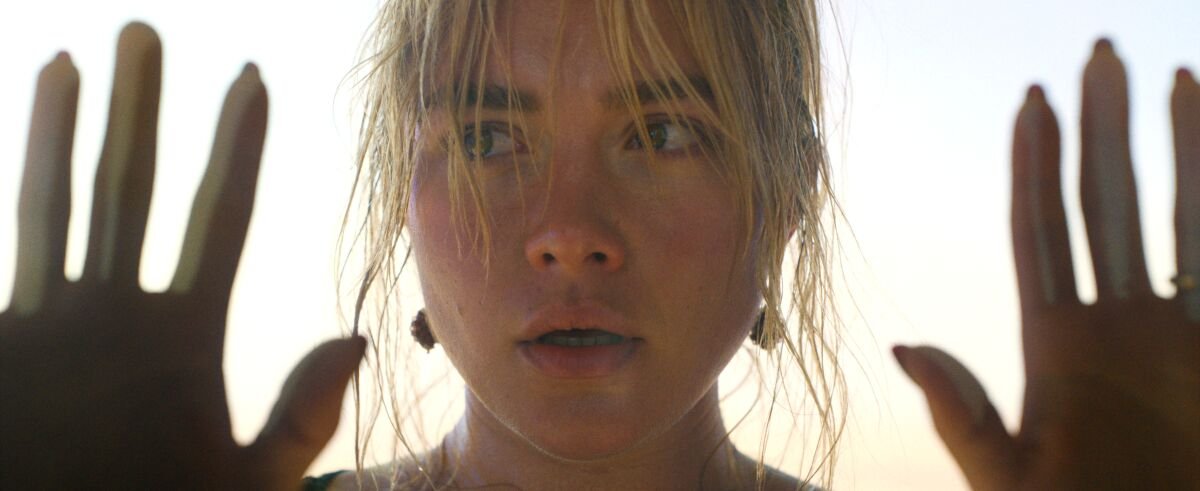Film Review - Don’t Worry Darling
Images courtesy of Warner Bros. Australia.
It is practically impossible to disentangle Olivia Wilde’s mystery thriller Don’t Worry Darling from its accompanying, and rather shocking tidal wave of controversy and exposures. The truth is that this movie probably would have flown under the radar had it not been for the drama-filled revelations being uncovered practically every other week. Don’t Worry Darling became much bigger than it ever should have, and unfortunately this has coloured the way in which people have reviewed the film. Knowing what we now know made it difficult to even see Olivia’s face up onscreen, without thinking of her begging Shia LaBeouf to not walk away from her project. I will however attempt to remain neutral and judge the film solely on its own merits…for the most part.
The film follows the ultra-happily married Alice (Florence Pugh) and Jack Chambers (Harry Styles), a young couple living in 1950’s technicolour bliss in the idyllic town of Victory. In Victory, the wives wave their husbands off to work each morning, dinner is never on the table late, and the husbands are promptly served a martini upon setting foot back in the house. But perhaps most important of all, the women here do not ask questions, especially about what their husbands do for work everyday at what is known as the ‘Victory Project’. The perfection of this world however soon begins to crack once Alice sees a biplane crash out in the desert. Naturally wanting to see if the people involved are okay, Alice charges out into the desert, beyond where she is ‘allowed’ to usually remain, only to find no sign of plane remnants, but instead the hub, the centre of the Victory Project, headquarters. Alice’s experience there is kept from the audience however, and instead Alice mysteriously wakes up back at home, and is told that there was no plane crash, and that she never went out into the desert. The film takes on a decidedly darker tone from this point forward and we must watch as Alice slowly acknowledges the harsh reality that this world is not what she once thought it to be.
Three main points stick out to me now as I reflect upon my experiences with this film. Firstly, at times it was undeniably visually arresting. Alice’s character begins to have flashes of alternate realities, visions of things yet to come, that whilst an obvious choice, stands apart nicely from the milk and cookies aesthetic of Victory. In particular the scenes of the walls literally closing in on Alice, and an especially visceral scene of Alice attempting to suffocate herself with plastic wrap, are done particularly well, creating an inflamed sense of urgency within the film, and desperation for Alice to escape. Overall, the film’s ability to visually depict the claustrophobic themes of the film in a way that was at times on the nose, was still successful in conveying Alice’s inner panic and stress, and this is one of the film’s greatest successes.
Secondly, perhaps one of the biggest fumbles this film makes is its treatment of the character Margaret (Kiki Layne). Margaret, Alice and Jack’s neighbour is the first of the women to begin to question the morality and logic of the world in which she lives, a display that greatly impacts Alice and practically forces her to begin her own investigation into this allegedly perfect town. Now in the film, Margaret is a relatively small role, however, in the continuous parade of exposures and lies that is this movie, actress KiKi Layne revealed her character initially had a much larger role that had to be cut down. Of course this is not uncommon in Hollywood, however when I recalled that Olivia Wilde’s character Bunny, who serves absolutely no function in the film apart from being Alice’s best friend, was granted copious amounts of screen time, this cut begins to make less sense. The decision to limit the screen time of this character rather than Bunny’s is not only questionable narratively, but also served to isolate Alice’s character further, forcing her to take this harrowing journey alone.
Lastly, I always find films that conclude with a “thank god we still don’t live in those times!” attitude, irritating, because it paints today’s society as some kind of progressive haven, where gender roles are merely a relic of the past, and a fun tchotchke to pick up for our own amusement, knowing that at the end of it all we can return to the much safer and freer present-day. For a lot of women around the world, modern day society isn’t much better than the 1950’s.
Overall, whilst this movie was somewhat average with a few visually thrilling moments speckled throughout, it is undeserving of all the vitriol it is currently receiving.
Follow Aimee on Instagram.
Don’t Worry Darling is screening in cinemas from Thursday 6th October. For tickets and more info, click here.

